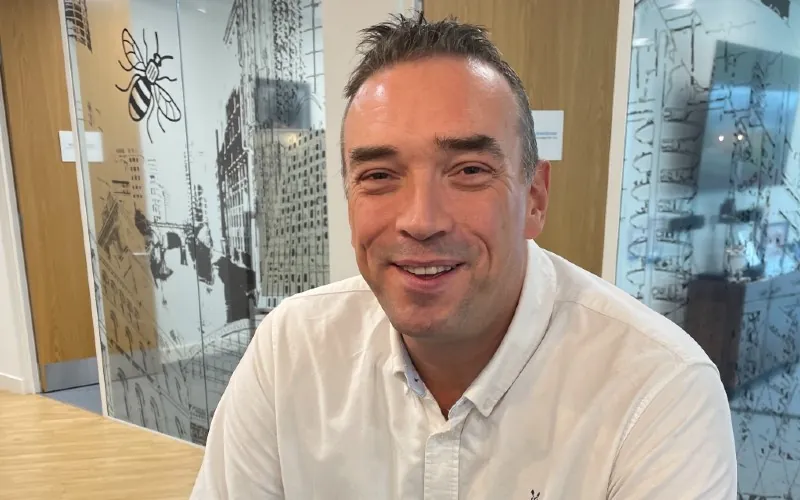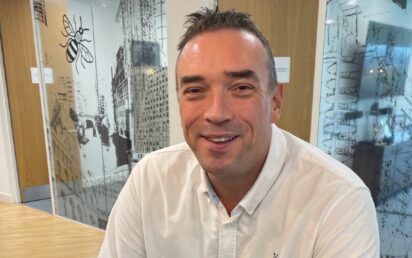A lot has changed since Walter Gleeson and Steve Oliver launched musicMagpie from a garage in Hazel Grove in 2007 – especially their office.
Today the company is based out of plush offices at Stockport Exchange, having moved there four years ago because they needed extra space.
“We were also struggling to attract and retain talent,” admits Oliver to TechBlast. “Our office is next to the railway station and Stockport Exchange has been transformed beyond all recognition.
“Stockport is a great place to do business for the three ‘Cs’ – cost, communications and culture. It’s cheaper than being in Manchester city centre and I can be there in eight minutes.”
The other big change at musicMagpie was the decision to float earlier this year, a move which signalled the partial exit of NVM Private Equity and a 12x return on their original investment.
“LDC were musicMagpie’s original private equity backer while NVM were with us for six years,” says Oliver. “They were a wonderful partner and are still an institutional shareholder now.
“The reason for the float was access to capital. We have some clear strategies of where we want to go and what we want to do next but both needed some capital and a float gave us access to it.
“I always want to think about what is best for the business first and foremost. But on a personal level, I thought long and hard about the IPO and whether it was something I wanted to do and decided ‘yes it is’.
“It was the final professional challenge for me. I’ve always wanted to challenge myself. I’ve done pretty much all aspects of business, from startup, MBO, M&A to scaling up.
“I’ve worked with private equity for 10 years but going public was the final frontier for me on a personal level.
“From the point of view of scrutiny for the business we are a consumer-facing business and there are more stories out there about us but it’s great for brand profile.”
The coverage included national stories about how much money the co-founders had made from the deal but Oliver says his motivation has never been about money.
“I’m pretty sure the people around me who matter would say it hasn’t changed me,” he says. “The reward of the IPO was as much to reward colleagues and people who have believed in musicMagpie over the years. It gave me as much pleasure and pride to see these people rewarded than my own situation.”
What does get Oliver animated is sustainability and the role musicMagpie has in driving the agenda.
“The world has come towards us in terms of ESG and sustainability credentials,” he says. “Recycling has always been at the absolute heart of our business model but for many years nobody other than us really cared about it very much.
“The world has woken up to sustainability, making smart decisions for the planet and suddenly ESG is at the top of everyone’s agenda.”
The key ingredient for global growth which is often forgotten
Oliver is on a crusade to tackle e-waste and earlier this year the company made global headlines for its Mount Recyclemore sculpture, which they exhibited near the G7 summit in Cornwall.
“It was a really important statement for the business to make in terms of us leading the green agenda on consumer awareness of e-waste,” says Oliver.
“We worked with a really talented artist called Joe Rush. He used 20,000 pieces of e-waste that weighed 12 tonnes in total to build the sculpture of the faces of the G7 leaders.
“It got incredible coverage all around the world, including me being interviewed live on Japanese TV, which was an interesting experience! It was also featured on the Jimmy Fallon Show and on The Late Late Show with James Corden.”
Mount Recyclemore is now on display at the Eden Project but the fight against e-waste has only just started.
“The average UK household has 11 old devices in the house like mobiles, tablets and laptops,” says Oliver. “Collectively that’s worth £16.5bn.
“I challenge you to go home tonight to find yours because they’ll be there. What happens is people receive their new or refurbished phone and put their old ones in the drawer because they’re busy or they think they might need it one day.
“A lot of the stuff that ends up in landfill goes via the ‘man drawer’ or the box under the stairs or the loft where people dump old stuff.
“Our biggest competition in this business is consumer apathy in doing nothing. That’s what we’re trying to do in re-educating people.”
What’s clear is mobile phones are a key part of musicMagpie’s business going forward.
The company started recycling mobile phones in 2012/13 but it was the investment from NVM in 2015 enabled them to speed up the payment process.
Oliver explains: “musicMagpie had always asked consumers who sold to us to wait for their money while we processed it. What NVM allowed us to do was invest in the process and pay the consumer the day the product arrived in our warehouse. It was one of the most important decisions we ever took because the key word – trust – is at the heart of everything we do.”
The process of selling unwanted phones has never been easier after the company agreed a partnership agreement with Asda for a roll-out of self-service kiosks.
“I’m a daft, lazy consumer myself,” admits Oliver. “I push the door when it says pull so we’ve focused on making the process of selling your phone as fast and easy as possible.
“The way it works is you get a valuation for your phone and then it invites you to put it into the inspection hatch. The door closes but you can still see your phone. It identifies your phone and IMEI number and inspects the cosmetic condition of it.
“At that point it either confirms or amends your offer price and you basically accept or decline. If you accept it the phone slides into a storage container at the back of the kiosk and you get paid instantly into your bank account. The whole process takes two to three minutes.
“40% of people who sell their phone in a kiosk say they wouldn’t have sold their phone otherwise.
“Trust is really important and people do clearly trust us. We’re doing an increasing amount of work with corporates and like with our consumer service, we offer them a certified data wipe. You can trust us to act responsibly if someone has left old data on their device.
“A third of the old phones that we buy have people’s data on that haven’t been factory reset. In a sense that feels a bit odd but it’s also a significant endorsement of how much people trust the brand.”
musicMagpie has also recently created a service where consumers can rent mobile phones from its eCommerce store in response to the fact that 50% of people have now split their handset from their airtime contract.
“We’re allowing them to take a monthly subscription on a phone for an average of £20 a month for a great refurbished phone that they can renew or upgrade every 12 months,” says Oliver. “They can then do a standalone airtime deal and for £15 you can pretty much get unlimited data these days.”
Oliver says it’s ‘game-changing’ and it’s now being extended into other products including iPads.
“It’s a disruptive new income model for the business,” says Oliver. “It creates a sticky relationship with consumers but it also builds a high quality revenue stream for the business. It will be simply transformational for us.”
He says he wants to drive behavioural change by making it as easy as possible to sell and recycle products.
“98% of our turnover comes from recycling activity,” he said. “We’ve always been a recycling business but it’s only recently that people have decided they really care about that. We need to stop putting things into the ground and we need to do something responsible with them and reuse products by giving them a second life.”
musicMagpie now recycles more than 400,000 consumer technology items a year, in addition to the 15-20 million physical media ideas like CDs, DVDs, games, books and Blu-ray discs.
The recycling ethos has been extended still further through an initiative called ‘Magpie Circular’. Put simply, Oliver hopes by leveraging their existing technology and infrastructure they’ll be able to reduce the disposable culture in other areas.
“Magpie Circular will put buyers and sellers truly together by using our technology, our logistics, our operations and our reselling ability to enable any brand or retailer the ability to ‘buy back old when selling new’,” he says. “We’ll grow our ESG qualities even further by leading the green agenda and driving a wider circular economy in more and more product categories.
“I’ve never been more excited by the future of musicMagpie as I am now. We’ve pivoted the business three or four times in our history and we are energised to be doing it again in such a major way with new disruptive buying methods and a new income model for the business.
“We’ve got more than 10 million eBay reviews and 99.5% positive feedback. We’ve built this business by delighting customers. This is not always easy when you’re buying and reselling used products because there’s an inherent element of subjectivity but we are very proud of our trust credentials and achievements.
“Trust alongside technology drives everything we do here. We use technology to drive the buying and selling of both media and consumer technology products. It’s the technology that makes us scalable and flexible because we can take the attributes of technology and trust into other product categories and territories as we wish.
“For now we are very focused on growing our US business whilst developing our three key projects of the monthly rental subscription scheme, kiosks and corporate recycling. Our strategy is simple. We are going to buy more so we can sell more and rent more. Ian Storey, my great friend and close colleague as COO at Magpie, has coined that summary of our strategy and I think it is a fantastic snappy explanation of what we are aiming to achieve.”
Oliver refers to his colleagues as Magpies and identifies Rachel Coxon’s recruitment as crucial.
“Two-and-a-half years ago we were joined by one of the most important people who ever joined Magpie and that’s Rachel Coxon, who is our chief people officer,” he says.
“What Rachel helped us to do for the first time was define who we were, what we stood for and what our values are. She came up with our five key values.
“They are led by ‘Magpies care’ and ‘Magpies make a difference’. They are the two key attributes of the business and it’s how I want to define the business as it’s everything that we and I stand for. That’s in my blood.
“When my Dad (Frank) ran his post office in Heaton Mersey he wanted to make a difference. He didn’t just serve his customers, he helped them and was a friend to them. He played a huge part in that community.
“Too many people think the world owes them a living. It doesn’t. Go and make a difference for yourself and care about your colleagues, your customers, your community and your planet.”


